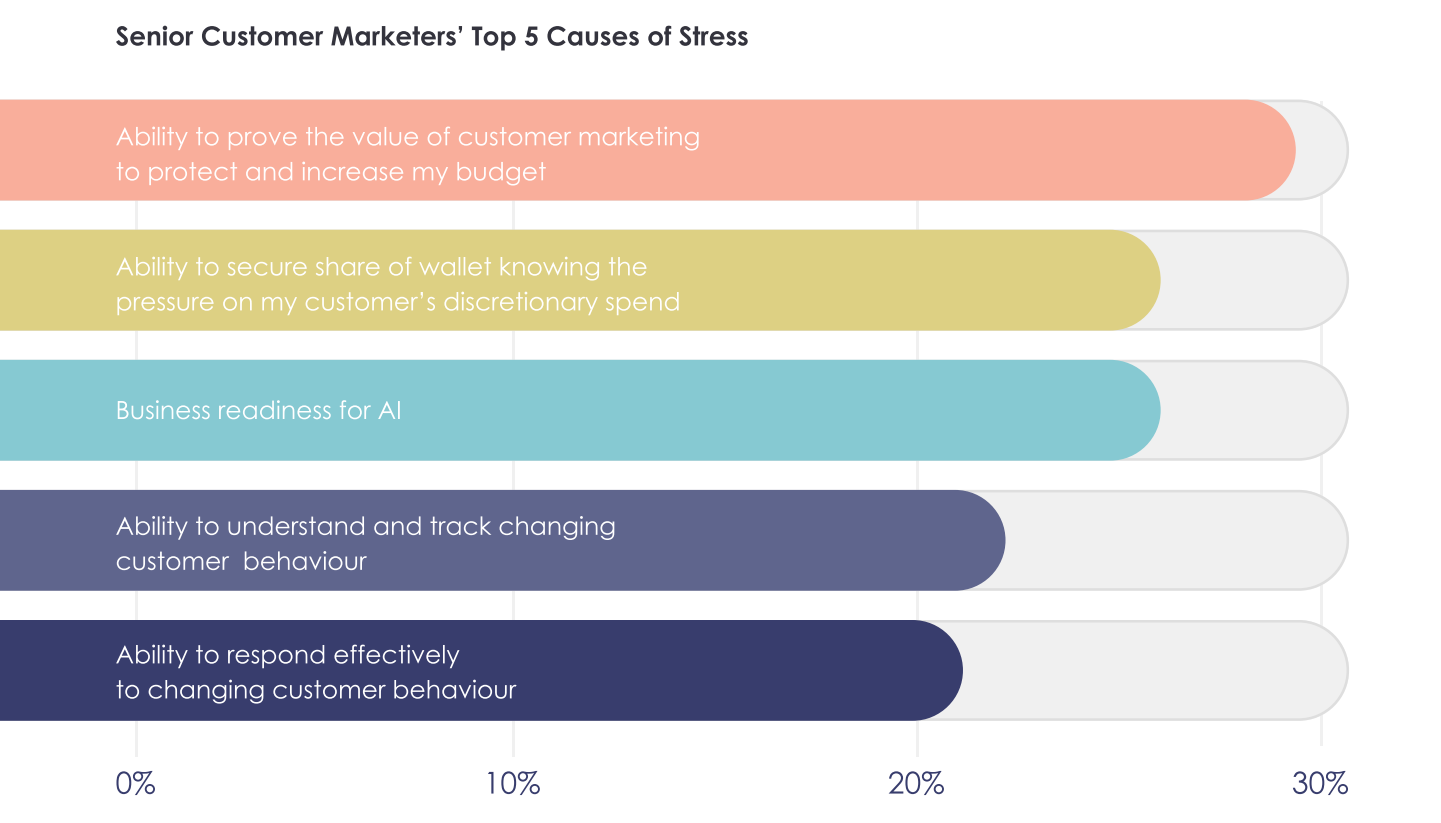Artificial intelligence (AI) has long been a hot topic in customer marketing, but recent advancements in Large Language Learning Models (LLMs) have made the potential of AI more tangible than ever before. But this explosion in visibility isn’t coming without some concerns.
Why AI is Keeping Marketers Up at Night
The rise of AI in marketing boils down to two critical questions:
- How will AI impact the role of marketing?
- What do businesses need to have in place to use AI to its full potential?
We’re not here to sound alarms about AI taking over marketing jobs. Instead, we believe that, when used correctly, AI will enhance marketing and CRM teams. It will speed up the transition from insight to action and address key content challenges, transforming how businesses understand and respond to customer preferences and needs.
Interestingly, AI readiness has now surpassed traditional marketing concerns like understanding and responding to customer behaviour. This shift highlights how technological advancements can drive business objectives, and perhaps a bit of FOMO (fear of missing out) is also at play. Regardless, AI’s prominence on the marketing agenda is undeniable.

Fast-Tracking Customer-First Agendas
The adoption of AI is poised to accelerate customer-first and loyalty initiatives. By industrialising insight and content creation, AI can deliver more relevant experiences and automate the right decisions and journeys for customers. However, before this can be achieved, several fundamental concerns must be addressed.
Key Challenges in AI Adoption
- Privacy Regulations: Nearly 30% of respondents cited stress about privacy regulations as the biggest challenge in adopting AI. Additionally, 28% are concerned about brand governance when using AI. Despite AI’s potential for content automation, hyper-personalisation, and advanced targeting, marketers remain cautious about its safety for their brand.
- Data Issues: Disjointed data is a barrier for 24% of respondents, while 22% feel their data quality is too poor. Effective AI requires a wealth of centralised customer data that can be quickly identified and matched.
- Enabling Technology: Lack of enabling technology is a concern for 26% of respondents, and 22% struggle to integrate AI with legacy systems. Marketers need the right technology to implement effective AI strategies.
Conclusion
Ultimately, AI is only as effective as the data it’s trained on. Many marketers still lack the necessary data foundations to fully leverage AI’s potential, and rigid legacy systems are holding many teams back. Addressing these challenges is crucial for businesses aiming to harness the power of AI in customer marketing.
Read our free report to learn more about senior marketeers’ everyday challenges and how to overcome them to advance your marketing initiatives.
Blog posts

The Decisions Behind the Decisions: What AI in CRM Really Depends On
Insights from Plinc’s breakfast briefings in London and Manchester, where senior CRM leaders from Space NK, Secret Escapes, Currys, Secret Sales and Crew…

CRM Resources That Landed Best This Year
CRM leaders are navigating rising expectations around personalisation, prioritisation, and AI decisioning, while trying to focus effort on what will…

Inside the Personalisation Payoff Report: What Customers Really Value in 2025
Personalisation has been at the top of marketing agendas for more than a decade. Yet despite the time, technology and effort invested, many brands are still…

Personalisation in Practice: What We Learned from CRM Leaders in London
Insights from Plinc’s breakfast briefing in London, where senior CRM leaders from Moonpig, Anthropologie Europe and The Body Shop discussed how to build…

Personalisation in Practice: Key Takeaways from Manchester’s CRM Leaders
Insights from Plinc and the DMA’s breakfast briefing in Manchester, where senior CRM leaders explored the biggest blockers to personalisation, how to…

Using Real Time Personalised Content for Customer Retention
As personalisation moves from a nice-to-have to a growth driver, real-time content has become essential for keeping customers engaged. This article explores…

